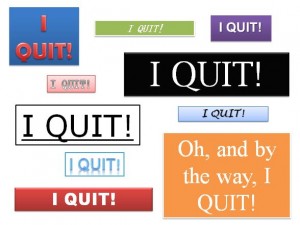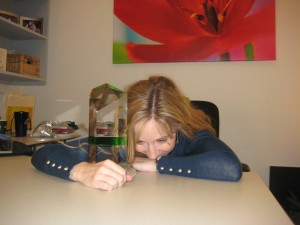Living Your Values
Stress is Not Mandatory
For most of my career I thought stress was unavoidable and therefore something I needed to simply accept. You know how it is in an office – the deadlines, the pressure, the politics – it’s always something.
It could be diminished by a relaxing vacation and it could be forgotten about when I was immersed in a good book, but stress was always present in one form or another.
Then I quit my job and realized I didn’t have to just accept it. After all, I quit that whole pile of job stress and walked away!
Of course as I changed my career I encountered new kinds of stress (I previously blogged about the difference in pressure being an entrepreneur vs. an employee). But this stress is much easier to deal with. Once I unplugged from the corporate machine, life slowed way down. Now instead of a constant flow of adrenaline, there are ebbs and flows. There is also a lot more space to deal with the tension, both in my days and in my brain.
Stress is not mandatory.
If They’re Not Cheering For You, Ignore Them
In my last few days at my old job when everyone knew I was leaving, my coworkers were great. They were glad for me, they admired my decision and many were wistful because they wished they were leaving, too.
Outside of the office, it was a different story. When I happily shared the news with friends, their responses were often negative. One pal’s reaction was “Oh no, I’m sorry.” And then, “Why did you do that?” This was a guy who had listened to me complain for years about how exhausted I was from working all the time, who knew that I wanted something better for my life.
They weren’t trying to be mean; they just didn’t understand why I would leave a steady job to go write for a month and launch a business. They were a little concerned about the risk I was taking but mostly they were reflecting their own fear.
They were unhappy in their careers but afraid to make changes. They projected their worries about what would happen if they didn’t have regular jobs. The uncertainty was too scary.
I was disappointed that these friends didn’t celebrate with me, but I understood why. I also understood that I didn’t have to listen to their doubts. The cheering section was much more fun!
Once You Decide to Quit Your Job, You Might Enjoy it More Than Ever
It is a phenomenon that I heard over and over from people who I spoke to about quitting their jobs. Once they decided on a specific date to resign, they started enjoying their work again.
Most of these people were waiting for an event several months in the future, like receiving an annual bonus, before they announced that they were leaving. So while they knew that they were on their way out, their coworkers and managers did not.
This secret changed the way they thought, felt and behaved at work. One woman who spent half a year planning to quit her law firm said, “Those were the best six months of my career.”
These are the reasons why deciding to quit made employees like their work again:
They spent more time with coworkers they cared about. They knew that they weren’t going to see them five days a week anymore and would miss them. They made a point to stop by their desks to chat, eat lunch together and enjoy their company while they still could.
They stood up for themselves. On the flip side of missing their friends, there were other coworkers that they were looking forward to never seeing again. Until then, instead of ignoring or downplaying passive-aggressiveness or behavior designed to humiliate them, they told the offenders that it wasn’t OK to treat them that way.
They took more risks. All those great ideas that were tamped down out of fear of failure suddenly had new potential. Instead of going along with their managers’ terrible business proposals, they pointed out how different approaches would generate better results.
They set boundaries. They stopped working late nights and went home for dinner. They put their smartphones down and spent their weekends with friends and family, having fun and relaxing.
They kept it in perspective. Instead of getting worked up about the crap their bosses said, their long commutes and inane company policies, they reminded themselves that in a very short time it wouldn’t be their problem any longer.
All of this adds up to taking their power back. They had a lot less to lose since they were on their way out and wouldn’t be around to be punished in the next annual review. They stopped being afraid and started prioritizing their health, relationships and happiness.
Wouldn’t it be great if employees treated themselves with this level of self-respect all the time, not just when they are about to quit?
People underestimate the importance of their work environments
Is it just me, or does anyone else find a picture of a person with their laptop and their feet in the sand disturbing? The glare from the sun, specks of sand getting on the keyboard, wind and bugs. And why not get your work done first and then go outside on the beach?
I’ve heard people say to knowledge workers, “you should be able to work anywhere.”
Sometimes this is said to employees who sit in ugly, gray cubicles with bad lighting and lots of noisy distractions. Or to temps and consultants who are asked to be productive in cramped vendor bays with six other workers and slivers of desk space, with chairs and desks that don’t adjust in height. One team that I worked with asked a vendor to do his work from a table squeezed in a narrow hallway until the fire marshal said he had to move.
It is true that you can take your laptop anywhere with a wireless connection and be able to send email, and work on documents, spreadsheets and PowerPoints. But there’s more to it than that.
I’ve met many consultants, writers and entrepreneurs who love to work out of coffee shops. Some of them hunker down in their favorite café, day after day, until they are so familiar with the staff and other regulars that they are almost like coworkers.
Other people I know – the writers especially – have a series of hangouts that they’ll visit throughout the day. They’ll write for a couple of hours at one spot, then move to the next.
For me, my home office is the best place for me to work. I constantly refer to the marked up printed pages of my manuscript on my bookshelf. The sticky notes that outline my chapters are in rows on my filing cabinet. Each time I make a change to the order or content of each chapter, I update the notes. Technically, these things are paper and I could move them from place to place. Psychologically they’re the structure of my book and I need them in order and easy to reach.
For my consulting work, I also have hard copies of files that I refer to frequently. I have headphones for conference calls, a smart card reader, backup drives and my printer/scanner. Plus, an ergonomic mouse, keyboard and footrest. Anyone who’s had carpal tunnel, tennis elbow or wrist injuries from overusing a regular keyboard and mouse will understand how non-trivial these things are. Non-trivial and not very portable.
Beyond the physical elements that make me productive in my own office, there is the benefit of a consistent routine. When I sit down at my desk, my brain knows it is time to get to work. It’s where I’m able to focus most consistently and repeatedly, day after day.
So while technically it is possible to work almost anywhere with a laptop and wireless connection, how effective is it? And more importantly, do you want to?
Employee Stress vs. Entrepreneur Stress
I had stress when I worked a full-time corporate job. I have stress now. What’s the difference?
Corporate stress came from unrealistic workloads, office politics and being asked to participate in business decisions that I disagreed with. Working in a stressful environment is like breathing in low levels of poisonous air every day. It won’t kill you all at once. It is a long, slow decline.
Entrepreneur stress is completely different. It is the flip side of the positives parts of working on my own. It comes from the pressure I put on myself to spend more time on my projects. It’s learning Quickbooks and all kinds of marketing and operational tasks that I used to have corporate resources to help me execute. It’s the uncertainty of not having a scripted career path.
This kind of stress is much easier to live with. I can decide how many hours to spend on my business and writing projects. I can outsource tasks that aren’t my strong points and that I don’t enjoy doing. I can tame my thoughts when I worry.
All stress is not created equal.
Multiplying by Zero
 Years ago I was working for a company that I cared about enormously. I was loyal and worked hard and really wanted to be there. But during the last year or so of my employment, things got weird.
Years ago I was working for a company that I cared about enormously. I was loyal and worked hard and really wanted to be there. But during the last year or so of my employment, things got weird.
I would do something very well and it would be ignored. For example, the company used logos that were different sizes and fonts. I changed them to be consistent and not only did it look better, but it eliminated an entire set of decals that were being printed and stored, which saved about $5,000 every month. The reaction was somewhere between a yawn and a blank stare.
Another time I was chastised for not going out to dinner with a group of salespeople the night before a customer event. I skipped the dinner because I was at the office making final preparations late into the night. I prioritized making sure details were in place for a successful event. They prioritized the social aspect of having an evening out with their coworkers. I was told that it seemed like I wasn’t a team player. Huh? The event went well, anyway.
This stuff was so strange to me. I liked most of the people that I worked with and it was confusing to have people that I cared about say and do things that just didn’t make sense.
I will never forget the advice I got during a graduate school leadership class. I was explaining the situation to one of my classmates and he said that he had a job that was like that once. I asked him how he resolved the problem. His answer was “I quit and got a job somewhere else.”
That statement shifted my thinking. I had put all of my energy into trying to understand the situation and fix it because I truly wanted it to work out. I started to realize that no matter how much I wanted it to get better and despite believing that my work benefited the company, I was only part of the equation. Maybe that seems obvious to other people, but until then I kept thinking that if only I could figure out what to say or do, the people around me would act more rationally.
Not long after the conversation with my classmate, one of the vice presidents at the company bought everyone a copy of the book Who Moved My Cheese by Dr. Spencer Johnson. It’s a parable that basically says, “If you’re no longer getting what you need in your current environment, go get it somewhere else.” The minute I put down the book I picked up the phone and called a staffing company. I made the call on a Monday and on Friday I interviewed for a consulting contract. I was hired the next Monday. Eight months after that I took a full time position and spent another twelve years working there.
Most of my thirteen years there were great. The last few were not. Again, I had years invested in the company and there were enough good things about it that I kept looking for jobs on other teams and waiting for the next reorganization to see if it would make things better. None of that worked. I came up with my own analogy: it was like multiplying by zero. It didn’t matter how many hours I worked or what impact my programs had on the business. Everything that I did was cancelled out because where it intersected with the organization was like multiplying by zero. The end result is always the same. Zero.
One year ago today I quit that company. Now my happiness is multiplied each time I find projects that align with my values: working with people I respect, flexibility to work at home, the ability to make an impact through my projects and fair pay.
It isn’t always easy on my own, but the math makes sense.
An Abundance of Time, No Time to Waste
I had an abundance of free time.
After I quit my job and returned home from my summer writing program, I had things to do. Those things just didn’t take up much time. The startup business that I co-founded moved very slowly. I met with my business partner once each week and I completed the tasks I was responsible for in a few hours in between those meetings. And, I started writing a book. But I was only able to write for an hour or two a day before the part of my brain responsible for getting coherent sentences onto my PC would shut off.
That left a lot of free time.
I’d wake up in the morning, make tea, meditate, and then…
Exactly. And then what?
Exercise most days. Go to a writing group, visit a friend for lunch, read, or take a walk. Attend meetings for associations I belong to. Read poetry at open mic events. A little consulting and volunteering here and there. I took an eight-week improv acting class, visited three wild animal rescue centers, traveled to Idaho for a retreat and took two trips to California.
It wasn’t that I was wasting time. In fact I refused to waste time by watching tv, aimlessly surfing the web, playing games on my phone or doing anything that didn’t feel meaningful. I refused to be busy for the sake of distracting myself. And so without much distraction, I had A LOT of time to experience a full range of thoughts and feelings that otherwise I wouldn’t have time for.
It felt like I was on an endless silent retreat, left alone with my thoughts and feelings.
Some feelings were positive. Getting plugged into the Seattle writing community was fun and interesting, and sometimes I felt happy and excited about the projects I was working on. But I often felt uncertain and doubtful about whether I was spending my time on the right things. Should I be traveling more or volunteering overseas, since I had so much flexibility? There were plenty of hours when I was restless and wanted something else to do besides work on my business or write, but I didn’t know what.
Then I felt guilty for not enjoying the luxury of time that I had.
I made a list of activities that I felt were justifiable ways to spend my time. The title of this word document was “Meaningful Ways to Spend My Time that Align With My Values.” I’m not kidding. The list wasn’t all about work; it included options like gardening, hanging out at the park and emailing friends. Having an approved list of activities was an attempt to feel OK about how I was spending my time but it didn’t help much. I had a relentless sense of needing to be productive and make a positive contribution to the world. It’s both grandiose and deeply true.
I had great days when I got a lot of writing done or took an inspiring class. I had many more days when I felt like an unanchored boat being tossed by the waves.
All of that changed when I started a full time consulting position. I am much happier now, no question about it. I still write, work on my business, go to yoga and see friends. I have plenty of time, energy and the flexibility for those things beyond my day job. I didn’t need that list of approved activities – I needed predictable work that took up more time, gave me structure, earned income and allowed me to contribute on a daily basis.
Some people might do well with a lot of unstructured free time. Those people are either more enlightened than me or less driven. Or maybe they just like tv.
Ten Benefits of Working From Home
10. Feeling self-righteous about reducing my carbon footprint by not driving to an office every day.
9. The cafeteria is my kitchen and it’s always open.
8. No awkward chitchat in the restroom.
7. My work at home uniform = track pants and a t-shirt.
6. Wearing big ugly eyeglasses and not caring what I look like.
5. My office could not be better suited to me than if I had designed it myself…oh wait, I did design it myself.
4. Being at home for the plumber, the electrician and front door deliveries.
3. Not wearing shoes. Or makeup. Or a bra. And I’m not embarrassed to admit it because I’m not going to see you at the office anytime soon.
2. Less time commuting = more time to procrastinate working on my book.
1. Running after the cat with paper for him to throw up on as soon as the gagging noise starts. Seriously. When I make it in time I feel like a winner. I won!




Recent Comments